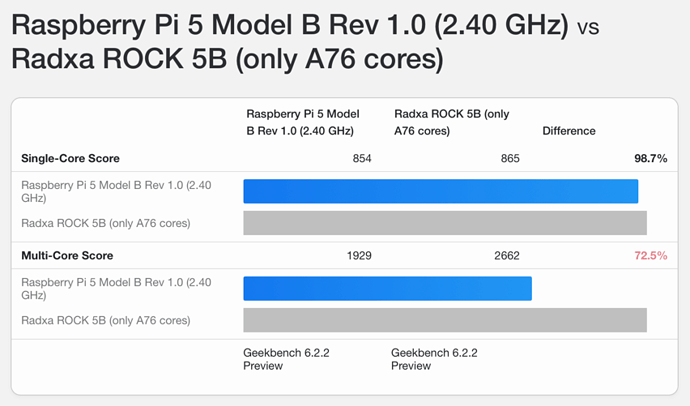well it does not improve the performance as it does in raspberry pi.
I have a rebased the patch to rockchip kernel here. With numa=fake=4 cores it does not improve the geekbench score. Even reduces to a point. Pci bus even compains about it.
NUMA: No NUMA configuration found
Dec 26 15:31:11 alarm kernel: Faking a node at [mem 0x0000000000200000-0x00000000c017ffff]
Dec 26 15:31:11 alarm kernel: Faking a node at [mem 0x00000000c0180000-0x00000001800fffff]
Dec 26 15:31:11 alarm kernel: Faking a node at [mem 0x0000000180100000-0x000000024007ffff]
Dec 26 15:31:11 alarm kernel: Faking a node at [mem 0x0000000240080000-0x00000002ffffffff]
Dec 26 15:31:11 alarm kernel: NUMA: NODE_DATA [mem 0xc017da40-0xc017ffff]
Dec 26 15:31:11 alarm kernel: NUMA: NODE_DATA [mem 0x1800fda40-0x1800fffff]
Dec 26 15:31:11 alarm kernel: NUMA: NODE_DATA [mem 0x1ffffda40-0x1ffffffff]
Dec 26 15:31:11 alarm kernel: NUMA: NODE_DATA [mem 0x2feea4a40-0x2feea6fff]
Dec 26 15:31:11 alarm kernel: Zone ranges:
Dec 26 15:31:11 alarm kernel: DMA [mem 0x0000000000200000-0x00000000ffffffff]
Dec 26 15:31:11 alarm kernel: DMA32 empty
Dec 26 15:31:11 alarm kernel: Normal [mem 0x0000000100000000-0x00000002ffffffff]
Dec 26 15:31:11 alarm kernel: Movable zone start for each node
Dec 26 15:31:11 alarm kernel: Early memory node ranges
Dec 26 15:31:11 alarm kernel: node 0: [mem 0x0000000000200000-0x00000000c017ffff]
Dec 26 15:31:11 alarm kernel: node 1: [mem 0x00000000c0180000-0x00000000efffffff]
Dec 26 15:31:11 alarm kernel: node 1: [mem 0x0000000100000000-0x00000001800fffff]
Dec 26 15:31:11 alarm kernel: node 2: [mem 0x0000000180100000-0x00000001ffffffff]
Dec 26 15:31:11 alarm kernel: node 3: [mem 0x00000002f0000000-0x00000002ffffffff]
Dec 26 15:31:11 alarm kernel: Initmem setup node 0 [mem 0x0000000000200000-0x00000000c017ffff]
Dec 26 15:31:11 alarm kernel: Initmem setup node 1 [mem 0x00000000c0180000-0x00000001800fffff]
Dec 26 15:31:11 alarm kernel: Initmem setup node 2 [mem 0x0000000180100000-0x00000001ffffffff]
Dec 26 15:31:11 alarm kernel: Initmem setup node 3 [mem 0x00000002f0000000-0x00000002ffffffff]
....
[ 3.901772] pci_bus 0002:20: Unknown NUMA node; performance will be reduced
[ 3.909246] pci_bus 0000:00: Unknown NUMA node; performance will be reduced
[ 4.225157] pci_bus 0004:40: Unknown NUMA node; performance will be reduced
In case anyone wonders the results, or has any suggestion to check something else.
UPDATE: i noticed that i havent issued the command with numactl, that invalidates all results, let me retest again.
UPADTE 2: After running with numactl --interleave=all ./src/Geekbench-6.3.0-LinuxARMPreview/geekbench_aarch64 score still did not change. So i am bailing out for now.
